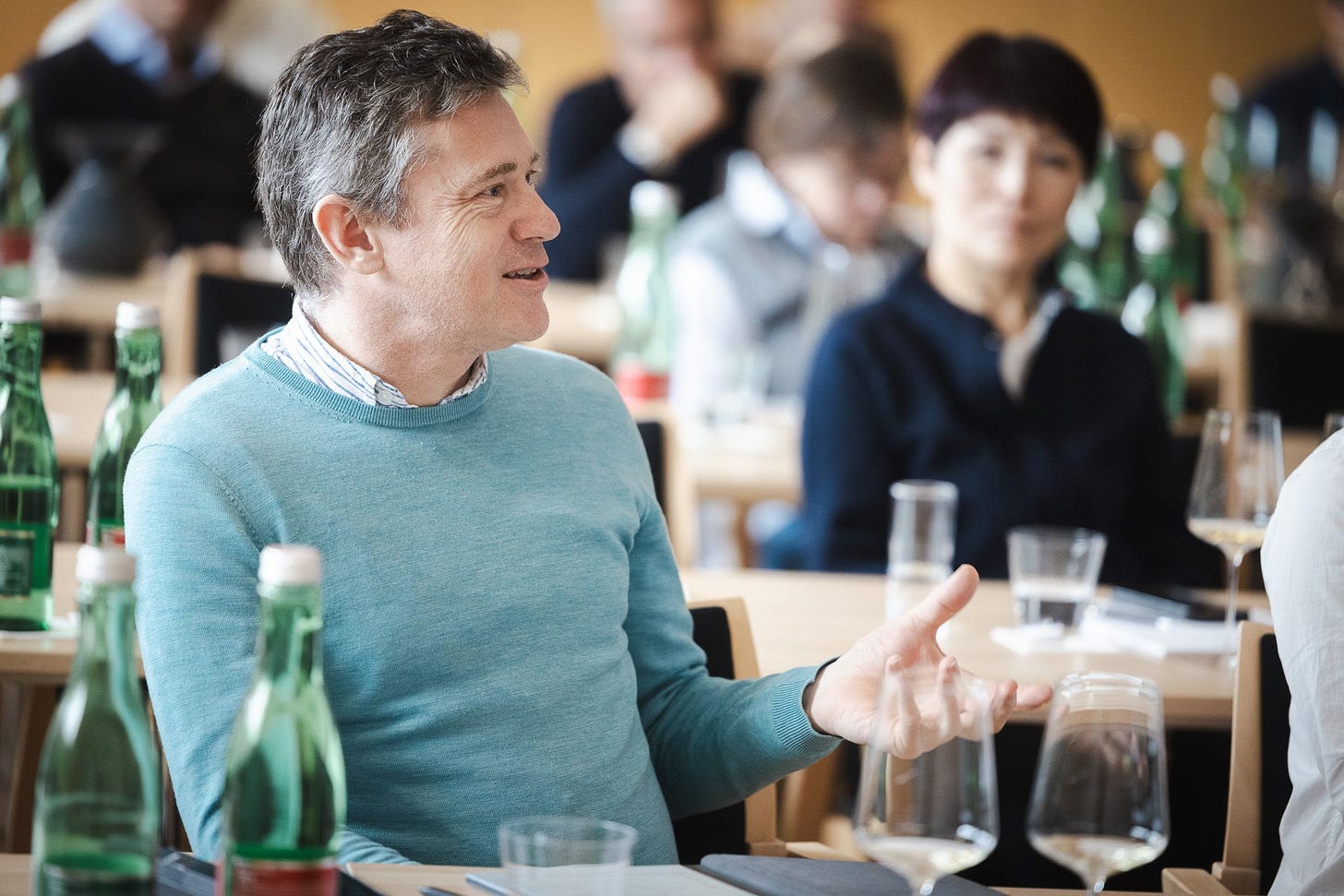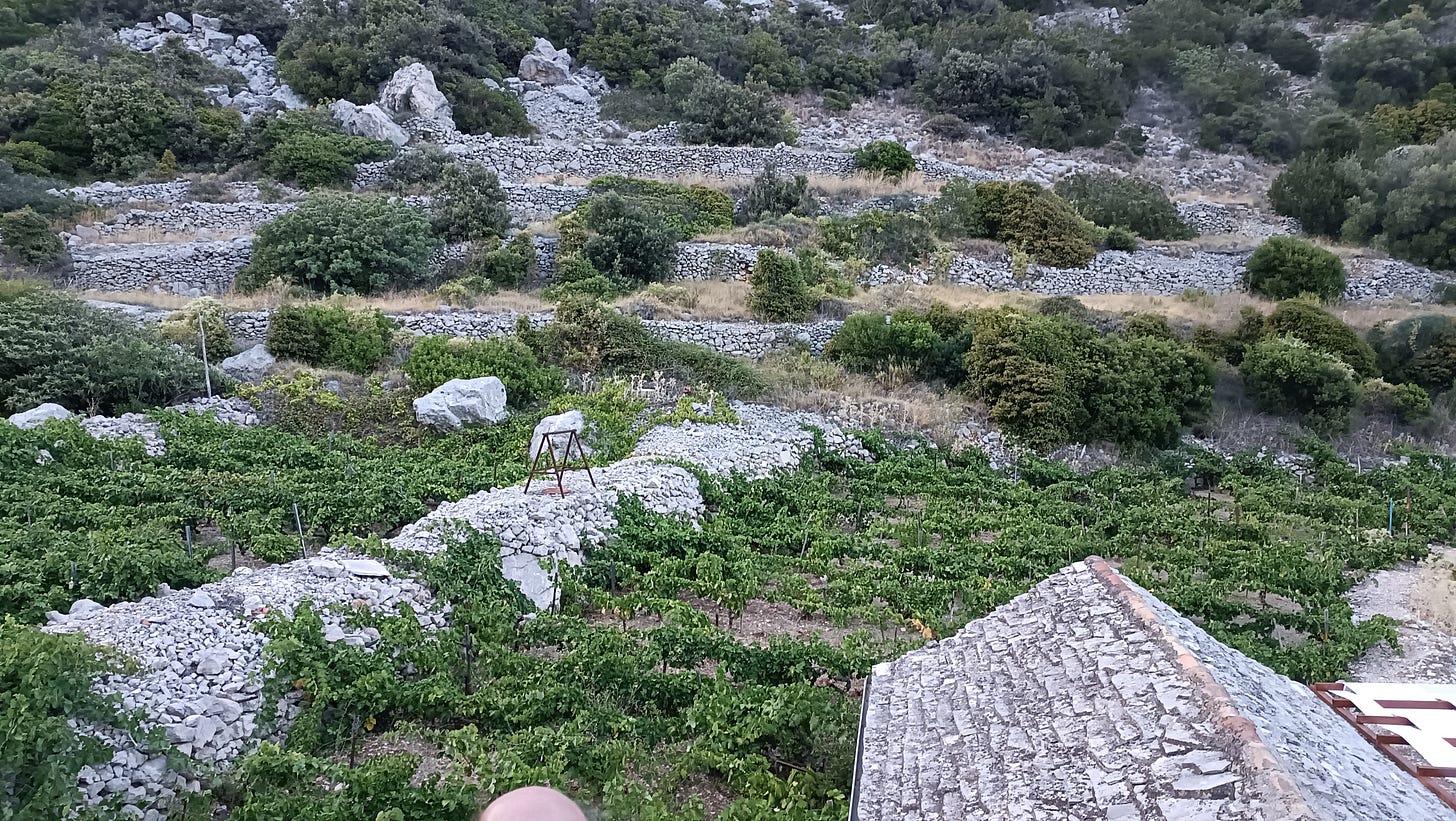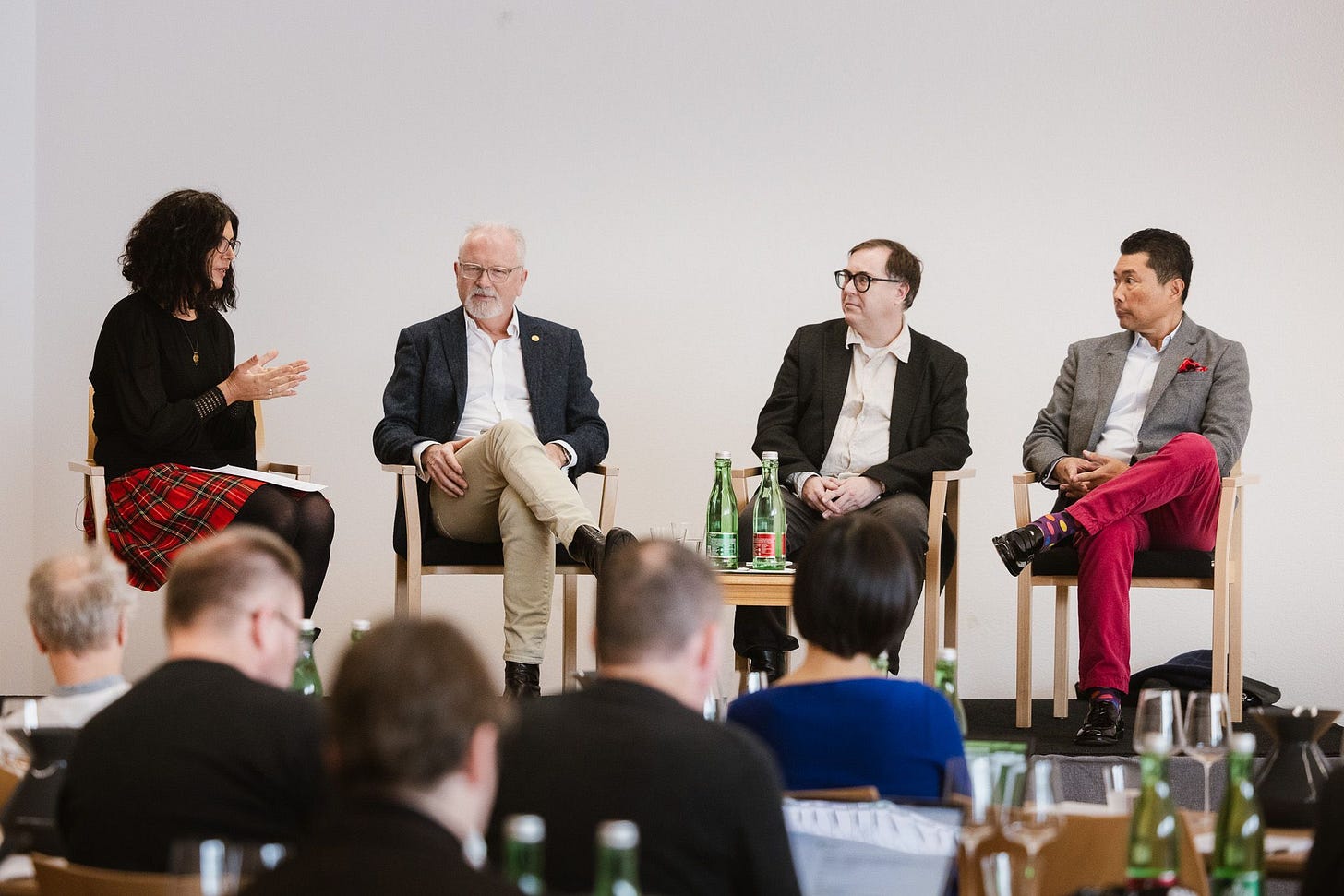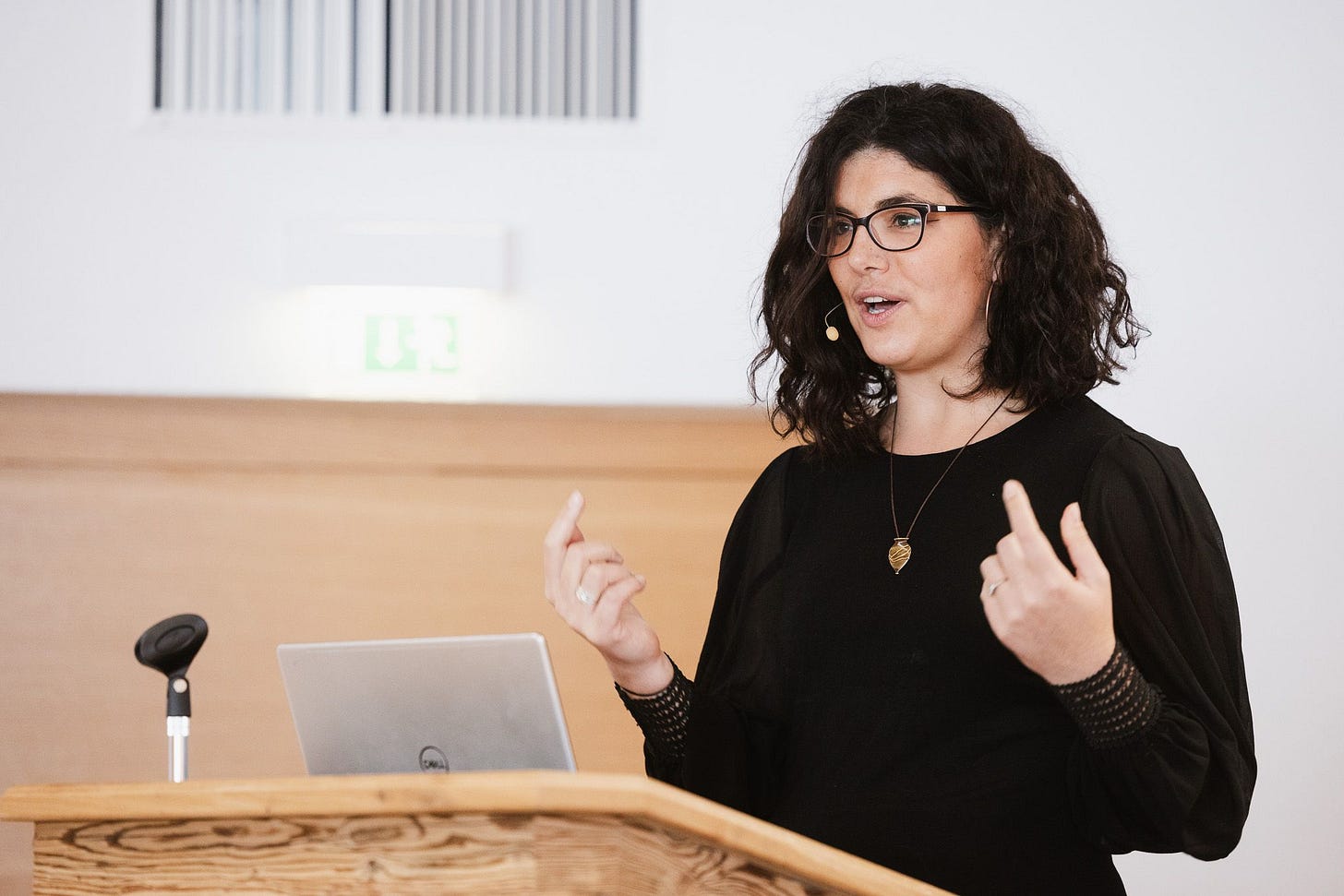Fine Wine isn't wine, it's just commerce
What does 'fine wine' really mean, and is it relevant for true wine lovers?
Last December, I sat in the conference room of an extremely expensive hotel located in Austria’s most exclusive ski resort town, Lech, with about 30 wine professionals. Four important people sat on stage and discussed the question ‘What is fine wine?’
In an era when the wine industry goes into apoplexy at the mere suggestion that wine might be a teeny bit elitist, this is a provocative topic. If you’re British like me, ‘faan waan’ conjures up images of the old school tie, besuited (male) wine critics and obsequious sommeliers wearing that ridiculous little metal trinket around their necks.
If wine in the 21st century is supposed to be for everyone, this picture is problematic. Its covert message is “wine is for everyone, but the good stuff is only for the worthy”. And sure enough, there are uncomfortable moments every few years when a bizarre kind of culture clash plays out in public. Cast your mind back to the awkward relationships between major Champagne houses and the rap stars who drink their top cuvées, for example.
I left that December session with more questions than answers. Here, I will try to marshal my conclusions, whilst telling you about those four important people, and what they said.
But first I want to tell you a story.
In July 2022, I splurged together with seven of my friends on a week’s sailing holiday around Dalmatia’s islands. The coastline is pretty sensational at the best of times, but under sail you can reach even more jaw-droppingly beautiful parts that are otherwise inaccessible.
One idyllic evening, we dropped anchor in a deserted cove off the south coast of Korčula. According to our maps there was a restaurant. A rusty metal sign fixed to the cliffs confirmed it with the text Restoran 70m, and a phone number. We rang and made a reservation for dinner, leaving enough time for a quick swim beforehand.
Welcomed by a brother and sister team, we were the only guests. Sat on the terrace, we admired a small plot of vines nestling in the rocky soils directly above the beach. As the grill was fired up to cook some tasty proteins, we ordered wine. The white was a forgettable Pošip from the mainland. The red was another matter.
“We make this ourselves” explained our host, as she pointed to the vines just metres from where we sat. “It’s our local grape Plavac Mali”. The wine arrived in pottery jugs. It was fresh, lively and bursting with fruit, clearly unfiltered and enjoyably rustic. If you’re familiar with Plavac Mali, you’ll know that it can be a beast. With Dingač, the most famous appellation on the Peljesac peninsula, you are lucky if you get away with only 16% alcohol. And it is often oaked to within an inch of its life.
Our island rendition felt fresh and pure in comparison. It tasted of sun, sea and rocks. It radiated with energy, seduced us with typical Plavac ebullience but refreshed us too. We ordered more, and then more again. This was a wine without artifice, the imprint from the land and the grape far stronger than the hand of the winemaker.
It wasn’t just the wine that was special. Our hosts explained to us that there are not many places like this restaurant left, even in Croatia. Most of the vegetables are grown onsite, and the lamb and squid that we ate were locally sourced. But most supplies have to be shipped in by boat, as the nearest road stops a kilometre away. Although the restaurant is often busy at lunchtimes when people come to enjoy the tiny beach, during the evenings the ‘staff’ never knows if they will have customers or not.
At the end of the night, we asked if we could buy more Plavac Mali to take to our catamaran. Yes, no problem, they could sell it to us in plastic litre bottles. Another wine loving friend posed the question “do you also bottle it (in glass)?”, with the thought of taking some of this joyful nectar back home. “Nema problema” came the reply. This is what the bottles looked like (you’ll have to imagine the wine inside).
I risked stashing a litre in my suitcase on the flight back. It made it home, and despite all the cliches about holiday wine tasting disgusting when you’re back on terra firma, it remained almost as delicious. I enjoyed every glass, even if the last one proved that the wine was almost certainly unsulphited 🐁.
The take-home? I will remember that night and that wine as long as I live. The flavours live on in my imagination, and that taste memory then conjures up the idyllic surroundings, and the perfect conviviality of the evening. In terms of experiences, it was mighty fine.
Let’s return to the panel discussion in Lech. The session was chaired by Pauline Vicard, co-founder and executive director of Areni Global - “A think tank dedicated to the future of fine wine”. The panelists were Simon Tam, an erudite fine wine auctioneer based in Hong Kong, Adrian Garforth MW, Chief Strategic Officer of the wine club 67 Pall Mall and Arnt Egil Nordlien, responsible for fine wine at the Norwegian wine monopoly.
Areni Global has iterated through four definitions of fine wine, and Pauline took us through its latest version:
A fine wine is complex, balanced, with a potential to age - though highly drinkable at every stage of its development. It has the capacity to provoke emotions and wonder in the person drinking it, while reflecting the expression of truth intended by its maker. It is widely recognised, while being environmentally, socially and financially sustainable.
I bolded the parts that apply to my island idyll:
A fine wine is complex, balanced, with a potential to age - though highly drinkable at every stage of its development. It has the capacity to provoke emotions and wonder in the person drinking it, while reflecting the expression of truth intended by its maker. It is widely recognised, while being environmentally, socially and financially sustainable.
I can’t say whether our Croatian experience was financially sustainable. Our hosts admitted that they staff the restaurant as much out of love as anything else.
Areni Global’s definition feels a bit like death by committee. Much of it is aspirational rather than definitive, something pointed out by Jamie Goode during the session. But Pauline also offered a more concise definition, couched in the term “luxury wine” and exhaustively market-researched by Peter Teung and Liz Thach MW, who co-authored the book Luxury Wine Marketing: The art and science of luxury wine branding:
Luxury wine is of the highest quality, coming from a special place on earth, has an element of scarcity, an elevated price, and provides a sense of privilege and pleasure to the owner.
Again, I bolded the parts that I think applied to my experience in Croatia:
Luxury wine is of the highest quality, coming from a special place on earth, has an element of scarcity, an elevated price, and provides a sense of privilege and pleasure to the owner.
I hesitated over ‘highest quality’, only because this Plavac wasn’t intended to be more than a humble wine, although from what I could see the vineyards were healthy and quite exemplary. Perhaps you might question ‘provides a sense of privilege’. But I think all of us that evening felt incredibly privileged to have such a unique experience. It was something that money couldn’t buy, being remote, slightly random and dependent on everyone’s ability to be in the moment.
Vicard gave an insightful example to illustrate the difference between fine wine and luxury wine. Luxury goods group LVMH makes a clear distinction between its luxury wine brands (including Dom Pérignon and Krug) and what it calls vins d’exception. These include Clos Des Lambrays, Château d'Yquem And Château Cheval Blanc.
For the latter category, there is no growth plan, only the following stated mission: “Within our organisation, winemaking is not subject to commercial constraints; our business is only to promote the reputation of our estates.” Vicard aligns this with fine wine, and I think Teung and Thach’s definition fits this better than the luxury product tag. Luxury products rarely have the element of scarcity. Dom Pérignon’s annual production, for example, is around two million bottles.
How did panel members try to define fine wine? Arnt Nordlien admitted that “it’s not easy to define, but one thing you can do is look at the price”. As Teung and Thach imply, if the price isn’t “elevated” then it ain’t faan waan. So Dom Pérignon Brut, at roughly €200 a bottle on release, unquestionably fits. Any number of top grower Champagnes, which I bet would beat the Dom to a pulp in a blind tasting, can be had for half or even quarter of that price. I would drink Tarlant’s Cuvée Louis (around €100) or JM Séleque’s Partition (c. €80) in preference.
Pricing at the fine wine level has little if any relation to quality or cost of production. The price signals to the desired customer base that the product is expensive enough to convey status.
In other words, this has nothing to do with wine - as in the liquid in the bottle.
Adrian Garforth wanted to be the everyman. “Do we need a definition of fine wine?” he posited, adding “We just like to offer wines that will delight our customers”. Nice try Adrian, but given that it costs over €4,000 to join 67 Pall Mall, the whiff of exclusivity and elevated prices hangs heavy in the air even before you enter the building. I sympathise that neither he nor his staff enjoy servicing what he terms “the trophy hunters” or label drinkers. But the whole experience is priced to attract this segment.
Roman Horvath MW, director of Domäne Wachau - one of Austria’s largest and most successful wineries - admitted that when he visited 67 Pall Mall (as a guest), he was intimidated. He added that he is “disgusted by the millionaire idea of putting a bottle of Chateau Pétrus on the table”. For Horvath, the concept of fine wine excludes all but a minute proportion of the wine drinking population.
Jamie Goode added further weight to the idea that fine wine is only defined by money. “The only definition is ‘is there a secondary market for the wine?’” he said. If you’re a natural wine lover and you wondered whether this article had any relevance for you, here is where this shit gets real. Domaine des Miroirs, Ganevat and Overnoy have arguably become fine wine, according to Jamie’s definition. Natural wine is not immune from market distortion.
Simon Tam gave valuable insight into the Asian market, debunking the notion that fine wine has to be made from a recognisable grape with the examples of Pingus and Sine Qua Non (a Californian winery specialising in Rhone blends). He also noted that “most people with black hair are not drinking their expensive wines with 3 star Michelin food. They are drinking them with the local cuisine”. But he had to admit that “most people can’t get away from the idea that high price means high quality”, flippantly adding “and we all know that is complete bollocks!”
Pauline laid out Areni Global’s focus and purpose as part of the session, saying “fine wine needs to lead by example. When you sit at the top of the tree, you have a responsibility”. I admire her focus on sustainability and equitability. But I struggle to equate these lofty goals with the wording ‘fine wine’. It’s a term that has become laden down with dubious baggage. The associations with wealth, privilege and exclusivity are impossible to shake off, as proven by the discussion in Lech.
A century ago, fine wine probably did just mean “the best wine”. Etymologically, the word fine may be related to ‘finished’, with the idea of something complete, well-rounded, or indeed well-finished. But thanks to global commerce, speculation and capitalism it has become conflated with the idea of luxury and stratospheric prices. I wish that Areni Global hadn’t decided to fixate on this specific term.
Returning to my Croatian experience, take a look at the boxes that weren’t ticked. What made it not fine wine? The pricing was not elevated (quite the opposite). There will never be a secondary market for this wine. Perhaps it doesn’t have the potential to age. It is not widely recognised (it doesn’t even have a brand name).
Are any of these attributes required to have an enjoyable, or even transcendent wine experience? I don’t think so. Here is what I love about great wine, and what makes it special:
It’s a social lubricant, which allows people to come together and relax. The buzz stimulates conversation, conviviality and happiness.
Great wine connects you to a place, and even to its culture. It can transport you by association. When I think back to the ripe fruit of that Plavac, I’m instantly reminded of a glorious summer evening, the smell of the Croatian garrigue, grilled seafood and laughter. I think about island life and about the brother and sister continuing their family’s tradition.
The best or finest wine must have a feeling of vibrancy and energy. It should make me lust for another glass. There should be no perceptible filter between the drinker and the expression of the grapes, the vineyard, the soil. I don’t mean ‘filter’ literally, although filtration is certainly one of a number of possible obstructions.
My Definition of Natural Wine
Check out this article where I laid out in more detail what is important to me personally, when it comes to winemaking.
All of this brings me to the conclusion that I don’t need any of the trappings of fine wine. If you are a wine lover, I doubt you do either. As an idea, it does nothing to guarantee a sensational or exceptional experience - some of the most soulless fermented grape juice I’ve ever tasted sat in the fine wine category. It doesn’t aid discovery either, because hey, fine wine has to be widely recognised.
Fine wine has become a morally bankrupt concept, which suits only the trophy hunters and the industries that feed off their wealth. Worse still, it has prompted massive price increases, with the result that many great wines are no longer affordable for 99% of wine lovers. Fine wine is exclusive, in the worst sense of the word.
If you truly love wine, you need fine wine like you need a hangover. It is not wine, it’s just commerce.
The inspiration for this article came from the Arlberg Weinberg conference, organised by Wine + Partners. Thanks to all the sponsors.










Late to the (very interesting) discussion. Here's a story to put things into perspective.
In 1994 we bought a wine domaine in the Languedoc. At the time, there was a cave coop and ours was the only other winery in the local area. One of the villages asked me if we intended to make "grand vin" which to all intents can be translated at fine wine. Having worked at Bibendum whilst at uni, I assumed he meant wines like cru classé Bordeaux. It wasn't so far fetched an idea as we were only a few kilometers from Daumas Gassac who harboured ambitions to operate at that level.
I replied I'd like to make wines that good but didn't think it would be easy. The guy looked at me like I was mad and said, "I meant will you be selling the wine in a glass bottle rather than in bulk?"
Loved this